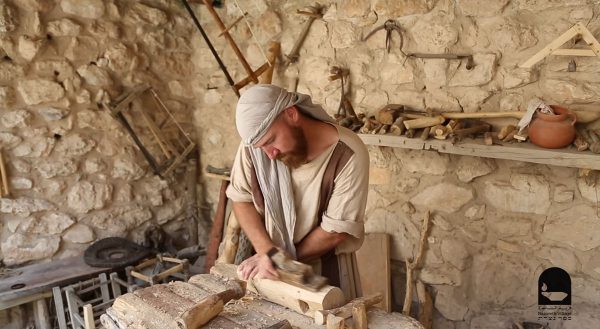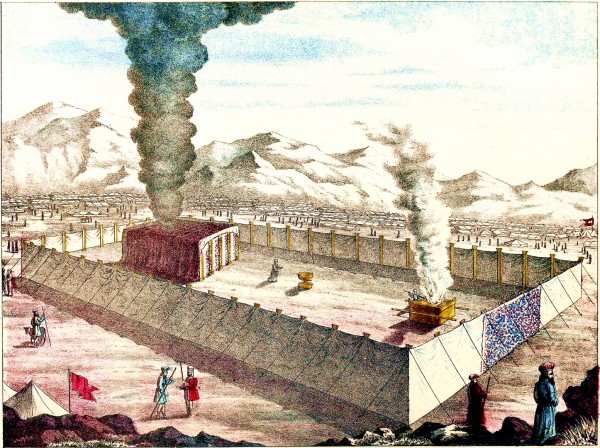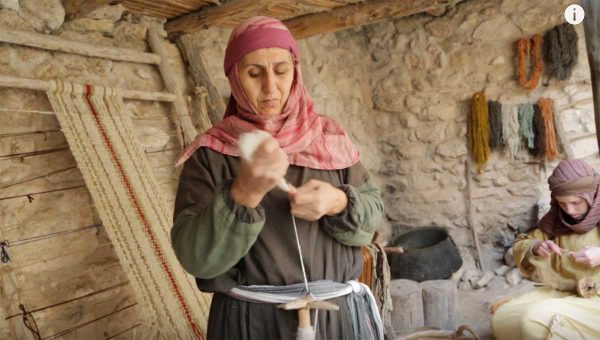
Carpenter working in a recreated Nazareth village workshop, similar to what Yeshua would have worked in before he began His ministry. (Nazareth Village YouTube capture)
“Whatever you do, work at it with all your heart, as working for the Lord.” (Colossians 3:23)
Are you still in the workforce or perhaps looking for work?
If so, know that no matter what kind of work you do, you have the potential to function as a priest, ambassador, or messenger on behalf of God and His kingdom!
How is that so?
We see a glimpse of this in the Hebrew word for work or occupation — melachah (מְלָאכָה), which might be related to malach (מֲלְאָךְ).
Malach is translated over 200 times as either the Angel of the Lord, angel or earthly messenger, as well as ambassador or envoy. At times, it refers to a messenger who is a prophet (Haggai 1:13) or a priest (Malachi 2:7).
So, if you ever felt insignificant at your job, this bit of linguistic insight can change your entire perspective.
But there’s much more to know about God’s plan and purposes for you and your work.

Downtown Haifa. Israelis often say, “Jerusalem prays, Tel Aviv plays. Haifa works.”
God Himself ordained work at the beginning of creation. (Genesis 1:28)
That means it is our moral duty to perform work and, as we’ll see, He gives us many reasons for that.

Holding up the Sefer Torah. On the container of the scrolls are images of the Ten Commandments
One reason is found in another word for work, which is ma’aseh.
In Deuteronomy 14, we see the words ma’aseh and ta’aseh, which help us understand that we receive a blessing for doing work.
“… the Lord your God will bless you in all the work [ma’aseh} of your hand that you will do [ta’aseh].” (Deuteronomy 14:29)
In Hebrew it is: לְמַ֤עַן יְבָֽרֶכְךָ֙ יְהֹוָ֣ה אֱלֹהֶ֔יךָ בְּכָל־מַֽעֲשֵׂ֥ה יָֽדְךָ֖ אֲשֶׁ֥ר תַּֽעֲשֶֽׂה
We find here that we have to do (ta’aseh) the work (ma’aseh) in order to receive the blessing from God—that is, make our work successful.
The Genesis of Work
Some might think that when God placed Adam and Eve in His perfect garden that He did not intend to give them work — that everything they needed and wanted would be available to them.
But that was not entirely the case.
Right after finishing His own work of creating the heavens and the earth and all living creatures, God told Adam and Eve to subdue the earth and rule over it. (Genesis 1:28)
The gathering of food became a toil only after Adam and Eve deliberately disobeyed Him.
God told Adam:
“Because you listened to your wife and ate fruit from the tree about which I commanded you, ‘You must not eat from it,’ Cursed is the ground because of you; through painful toil you will eat food from it all the days of your life . . . By the sweat of your brow you will eat your food until you return to the ground, since from it you were taken.” (Genesis 3:17–18; see also Genesis 5:29)
God emphasized His desire for man to work when issuing the Ten Commandments: “Six days you shall labor and do all your work …” (Exodus 20:9; Deuteronomy 5:13)
What is work?
One Jewish writer described it as anything that “represents a constructive, creative effort” and demonstrates a man or woman’s “mastery over nature,” which God gave us in Genesis 1:28.

The Mishnah (2nd century compilation of oral laws) lists 39 categories of melachah (work), all of which were used in the construction of the traveling tabernacle in the wilderness (Mishnah Shabbat 7).
The Genesis of Not Working
While God wants mankind to work, He ordained that we keep the Shabbat holy even before Adam and Eve disobeyed Him.
“God blessed the seventh day and made it holy, because on it He rested from all the work of creating that which he had done.” (Genesis 2:3)
He also gave the commandment to not work on Shabbat.
“The seventh day is a shabbat to the Lord your God. On it you shall not do any work, neither you, nor your son or daughter, nor your male or female servant, nor your animals, nor any foreigner residing in your towns. For in six days the Lord made the heavens and the earth, the sea, and all that is in them, but he rested on the seventh day.” (Exodus 9:11–12)
Some people rest on Shabbat, keeping it holy by pursuing their spiritual and relational development with God. They have family time, study the Torah (Bible), pray, and simply rest in His Presence.
For the other six days, however, God calls us to create, to dominate the environment (while also caring for it), and to find His purpose in doing so.

Central Street in the Orthodox Mea Shearim neighborhood of Jerusalem.
God’s Purposes for Work
Scripture helps us to find much meaning in our work.
We work to find self-fulfillment and dignity as Solomon wrote:
“There is nothing better for a man than to eat and drink and tell himself that his labor is good. This I have also seen is from the hand of God.” (Ecclesiastes 2:24)
We work to provide food for ourselves and not be a burden to others, which is dignifying. God clearly expects us to work for our own food when He told Adam, “By the sweat of your face, you will eat bread.” (Genesis 3:19)
Rabbi Sha’ul (the Apostle Paul) taught that no one should eat if they don’t work for it. (2 Thessalonians 3:10)
To set an example for new Believers, Paul worked when visiting the churches he planted and did not allow himself to be a burden to others. (1 Thessalonians 2:9, 4:12; 1 Timothy 5:8)

Early pioneers to pre-state Israel (1930s) did the hard work of draining swamps in the Jezreel Valley (left) so that bountiful fields can be grown there today (right), (National Library of Israel, Holy Land Collection)
We work to earn a profit, which allows us to supply for our own needs and give to charity so that others who can’t work, such as elderly widows and orphans are taken care of:
“In all labor there is profit [advantage, abundance], But mere talk leads only to poverty.” (Proverbs 14:23)
We work to avoid idleness. By working in any capacity, even as a volunteer or trainee, we avoid idleness — a lifestyle that is harshly condemned throughout Scripture, such as when King Solomon wrote these wise words:
“How long will you lie there, you sluggard? When will you get up from your sleep? A little sleep, a little slumber, a little folding of the hands to rest, and poverty will come on you like a thief and scarcity like an armed man.” (Proverbs 6:9–11)

Women in Scripture worked as homemakers, field workers, marketplace sellers of hand-crafted goods, servants, and more. (Nazareth Village YouTube capture of Hannah the weaver’s workshop)
We work to be His priests, ambassadors and messengers. Too often, Believers quit their jobs or resent them, feeling that they are not able to honor God in the secular marketplace, but that is far from reality.
No job is so trivial that it cannot glorify Him.
Our job is to be lights in the marketplace, which certainly need Godly men and women in it! (2 Corinthians 5:20; 1 Corinthians 3:9; 1 Peter 2:9)
How do we be this light?

Through the study of Scripture, we learn God’s standards for working with others as leaders and as subordinates, as buyers and as sellers.
We are to be honest, where many people in the marketplace are not.
We are to be hard workers, when many others are not.
And most importantly, we are to show God’s mercy and love, as many people have not experienced this in their lives.
By setting His standards as our standards, we set an example of being a child of God’s kingdom. Perhaps God will even give us supernatural wisdom or knowledge to solve problems no one else can solve. (1 Corinthians 12:8)
Our calling is to be loyal ambassadors and trust Him to see us through it all.
King Solomon, who was the wisest man writes:
“In the end, I saw that there is nothing better for a person than to enjoy their work, because that is their lot in life.” (Ecclesiastes 3:22)
And to work “is a gift from God.” (Ecclesiastes 5:19)

Orthodox Jewish violinist performs his craft in Jerusalem.
May you be blessed in all that you do. Whether you are retired, unable to work, looking for work, or have a job, remember that God desires everything you create to be for His glory, and that truly is a gift from the Creator.






